
The London Underground is a rapid transit system serving Greater London and some parts of the adjacent home counties of Buckinghamshire, Essex and Hertfordshire in England.
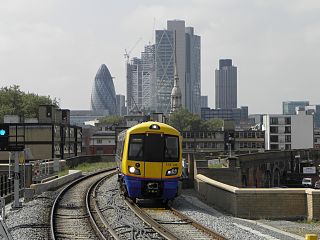
The East London line is part of the London Overground, running north to south through the East, Docklands and South areas of London. It was previously a line of the London Underground.

Baker Street is a London Underground station at the junction of Baker Street and the Marylebone Road in the City of Westminster. It is one of the original stations of the Metropolitan Railway (MR), the world's first underground railway, opened on 10 January 1863.

Crossrail is a completed railway project centred on London. It provides a high-frequency hybrid commuter rail and rapid transit system, known as the Elizabeth line, that crosses the capital from suburbs on the west to east and connects two major railway lines terminating in London: the Great Western Main Line and the Great Eastern Main Line. The project was approved in 2007, and construction began in 2009 on the central section and connections to existing lines that became part of the route, which has been named the Elizabeth line in honour of Queen Elizabeth II who opened the line on 17 May 2022 during her Platinum Jubilee. The central section of the line between Paddington and Abbey Wood opened on 24 May 2022, with 12 trains per hour running in each direction through the core section in Central London.

The Blackwall Tunnel is a pair of road tunnels underneath the River Thames in east London, England, linking the London Borough of Tower Hamlets with the Royal Borough of Greenwich, and part of the A102 road. The northern portal lies just south of the East India Dock Road (A13) in Blackwall; the southern entrances are just south of The O2 on the Greenwich Peninsula. The road is managed by Transport for London (TfL).

The Woolwich Ferry is a free vehicle and pedestrian ferry across the River Thames in East London, connecting Woolwich on the south bank with North Woolwich on the north. It is licensed and financed by London River Services, the maritime arm of Transport for London (TfL). Around two million passengers use the ferry each year.

Hammersmith Bridge is a suspension bridge that crosses the River Thames in west London. It links the southern part of Hammersmith in the London Borough of Hammersmith and Fulham, on the north side of the river, and Barnes in the London Borough of Richmond upon Thames, on the south side of the river. The current bridge, which is Grade II* listed and was designed by civil engineer Sir Joseph Bazalgette, is the second permanent bridge on the site, and has been attacked three times by Irish republicans.
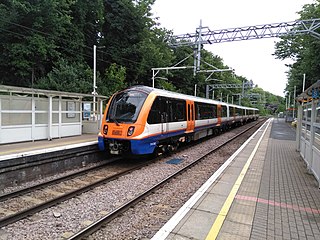
The Gospel Oak to Barking line, frequently unofficially called the Goblin, is a railway line in London. It is 13 miles 58 chains (22.1 km) in length and carries both through goods trains and London Overground passenger trains, connecting Gospel Oak in north London and Barking Riverside in east London. The line is part of Network Rail Strategic Route 6, and is classified as a London and South East Commuter line. On 15 February 2024 Transport for London announced that the Overground service will be renamed the Suffragette line as part of a strategic rebrand.

Shepherd's Bush is a London Underground station in the district of Shepherd's Bush in the London Borough of Hammersmith and Fulham. The station is on the Central line, between White City and Holland Park stations, and it lies in Travelcard Zone 2.

West Kensington is a London Underground District line station in West Kensington. It is located on North End Road (B317) close to its junction with West Cromwell Road/Talgarth Road (A4).
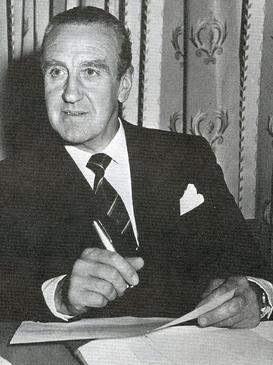
Alfred Ernest Marples, Baron Marples, was a British Conservative politician who served as Postmaster General (1957–1959) and Minister of Transport (1959–1964).

The London Underground S7 and S8 Stock, commonly referred to as S Stock, is a type of passenger train running on the London Underground's subsurface lines since 2010. Manufactured by Bombardier Transportation's Derby Litchurch Lane Works, the S Stock was ordered to replace the A60, A62, C69, C77 and D78 stock on the Metropolitan, District, Hammersmith & City, and Circle lines, which all dated from the 1960s and 1970s.

The Silvertown Tunnel is a road tunnel under construction beneath the River Thames between the Greenwich Peninsula and west Silvertown.

London has an extensive and developed transport network which includes both public and private services. Journeys made by public transport systems account for 37% of London's journeys while private services accounted for 36% of journeys, walking 24% and cycling 2%,according to numbers from 2017. London's public transport network serves as the central hub for the United Kingdom in rail, air and road transport.
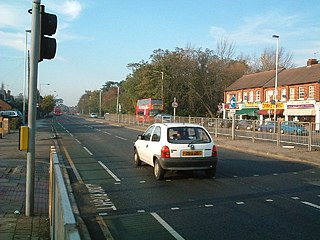
The West London Tram was a proposed on-street light rail line that was to run along the Uxbridge Road (A4020) corridor in West London, England. The scheme was promoted by Transport for London (TfL). It was postponed indefinitely on 2 August 2007, as it was opposed by the then councils of all three bisected London Boroughs.
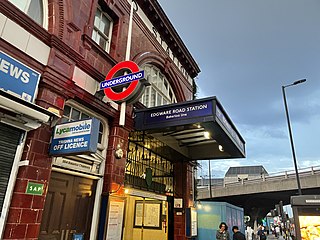
Edgware Road is a London Underground station on the Bakerloo line, located in the City of Westminster. It is between Paddington and Marylebone stations on the line and falls within Travelcard zone 1. The station is located on the north-east corner of the junction of Edgware Road, Harrow Road and Marylebone Road. It is adjacent to the Marylebone flyover.

Old Oak Common (OOC) is a railway station under construction on the site of the Old Oak Common traction maintenance depot to the west of London in Old Oak Common, approximately 500 m (1,600 ft) south of Willesden Junction station. When built, it is expected to be one of the largest rail hubs in London, at about 800 m (2,600 ft) in length and 20 m (66 ft) below surface level.

The Hogarth Roundabout is a major roundabout situated in Chiswick in west London. It connects the A4 Great West Road and the A316 Great Chertsey Road, two of the nine main radial roads to or from the city. The final section of the A316 is Dorchester Grove to the north; the local road Church Street leads south to the conserved and affluent Old Chiswick riverside area.
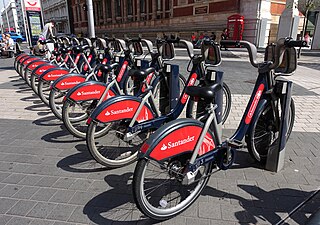
Santander Cycles is a public bicycle hire scheme in London in the United Kingdom. The scheme's bicycles are popularly and colloquially known as Boris Bikes, after Boris Johnson who was Mayor of London when the scheme began operating.























